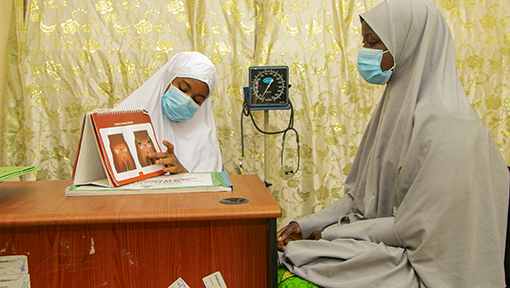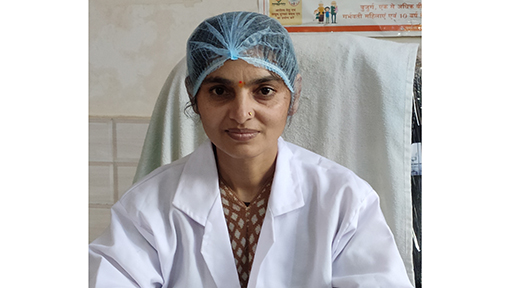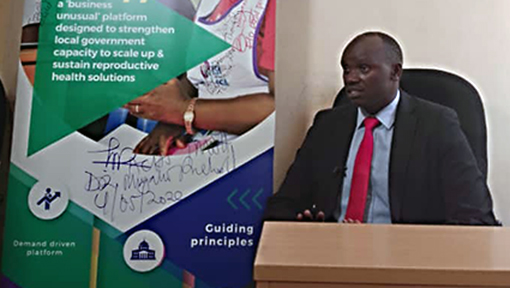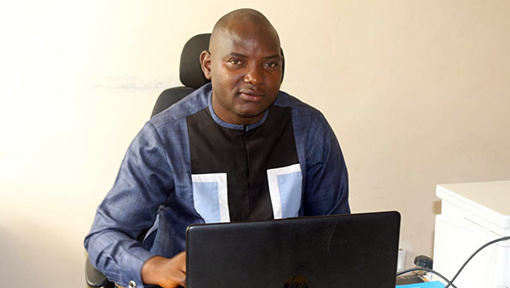The Future of Family Planning in Francophone West Africa Starts Here
Reprinted with permission from Intrahealth International
And it starts with women and young leaders.
By Hawa Talla | Project director for francophone West Africa, the Challenge Initiative
By Katherine Seaton | Editorial Officer
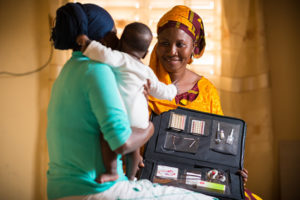
Photo taken in Senegal for IntraHealth International by Clement Tardif.
46% of West Africa’s population lives in urban areas. Additionally, one in seven women under 25 wants to delay or avoid pregnancy but isn’t using any method of contraception.
To meet women’s needs for high-quality family planning services in the region sustainably, IntraHealth International hosts the West Africa regional hub for the Challenge Initiative (TCI). In collaboration with the Bill and Melinda Gates Institute and with funding from the Bill & Melinda Gates Foundation, we work in urban areas to make sure women and girls have access to family planning services and connect with local governments and health systems at the city level to prioritize family planning services.
We sat down with Hawa Talla, IntraHealth’s leader of TCI in West Africa, to talk about the future of family planning in the region.
How are you changing the lives of young women in francophone West Africa?
We are working in ten cities across five different countries—Senegal, Benin, Burkina Faso, Niger, and Côte d’Ivoire—to help young women make informed decisions about reproductive health, learn how to protect themselves from violence, and create paths for themselves to lead.
We work in schools and with young transformational leaders, young people who have been mentored and trained to advocate for adolescent and reproductive health.
We are making sure that women and girls have access to family planning services.
I think about a 20-year-old girl from Benin who is already the mother of a young boy. She said that she loves being a young transformational leader because we are giving her the opportunity to help young girls avoid going through what she had to go through. She had to drop out of school and raise a baby all by herself. And raising a child is so challenging. It’s hard to succeed in your studies if you have other things to focus on. Even though she took a path that made it hard for her to succeed, we can give her and others like her the opportunity to course-correct their paths in life.
What are you most proud of about this work?
We are making sure that women and girls have access to family planning services and that they know their options when it comes to contraception.
We are helping cities scale up high-impact interventions that were tested and implemented in Senegal and then adapted in five countries (including Senegal).
We partner with religious leaders and community health workers and use fixed or mobile services to provide everyday family planning services for women and girls. We focus on providing services for poor women because we know that many of them want to use family planning services, but they don’t have the means to pay. Or even if the services are free, transportation to health facilities is expensive. So we make sure they have the information they need and organize services closer to them.
In schools, we make sure that girls and boys have accurate information and ensure that health facilities are youth-friendly.
What are some of the barriers?
One of the barriers in West Africa for young people is that family planning services cost money and usually young people don’t have enough money to pay for those services. But we’ve been working with transformational leaders who advocate for free access to family planning services.
In Benin, for example, young leaders talked to local government officials who then made a commitment to fund vouchers. They advocated for 2,000 young people for the first phase of the program and we think we can add more.
Now, young people can go to the health facility with a voucher and the facility sends a bill to the government for the services used.
Young people also face social barriers when it comes to reproductive health. In some countries, sex before marriage is frowned upon, while in others, girls are married before the age of maturity.
What do you think will be most important to family planning in West Africa over the next decade?
We must and can improve collaboration around family planning.
For example, we know that local governments have additional resources for family planning. We also learned that working with ministries of education and adolescents gives us easy access to young people, whereas in past programs it was very hard to do. We need to have a collaborative partnership and the same level of investment and effort needs to come from everyone.
It’s also important in francophone West Africa to change the way we talk about family planning. It’s clear people now understand what family planning is, but we need to have people speak up to talk about health, development, demographics, and what our region really needs, such as investments in adolescents and young people, which means investment in human capital.
What does the future of family planning look like?
We want to raise a generation of strong young leaders today so they can be the voice of family planning in the future. They are our future leaders.
We are one of the organizations in the area focusing on the future of adolescents and young people and I’m impatient to see what the next generation of leaders will look like.
Hawa Talla leads the Challenge Initiative in francophone West Africa, which is led by the Bill & Melinda Gates Institute for Population and Reproductive Health in the Department of Population, Family, and Reproductive Health at the Johns Hopkins Bloomberg School of Public Health.

